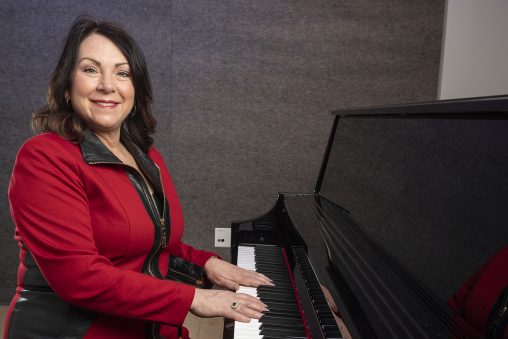
Ginger Minneman, lecturer of music, said new pianos acquired by the School of Music are essential for quality instruction. (Photo by Erin Pence)
Four new upright pianos and a rare pre-owned grand piano are making music at Wright State University’s School of Music thanks to the generosity of two local community organizations.
The School of Music acquired four new Boston 120 upright pianos and one pre-owned Petrof grand piano.
Prior to the purchase, the school had 20 grand pianos and 30 uprights. The grand pianos are mostly Steinways, but there are a few Kwai and Yamahas. The entire array ranges in age from 15 to 45 years.
“Our aging fleet of pianos needs significant upgrading, and the cost of maintenance and repair remains extremely high,” said Daniel Zehringer, professor of music and chair of the School of Music.
As part of the school’s accreditation by the National Association of Schools of Music (NASM), it must maintain healthy instruments in a state of good repair and age. Additionally, it wants to ensure that students are being provided with high-quality instruments to not only practice on but to prepare for their future performance careers.
“The majority of our piano fleet is well over 20 years old. It is time to begin the process of replacing them,” Zehringer said. “The process to replace 50-plus pianos of varying size and brand will require strategic planning from a time and financial perspective. I decided to begin by seeking funds from sources outside of the university.”
The School of Music received grants from the Isabel Herbst Fund of the Dayton Foundation and the Yellow Springs Community Foundation to purchase the pianos.
“The School of Music is honored to be chosen by both of these outstanding community organizations,” said Zehringer.
He said the four new upright pianos have been placed in the teaching studios of vocal, violin, and viola professors, while the Petrof grand piano is now housed in a practice room for piano majors. The pianos that were previously housed in the instrumental and voice professors’ studios were moved into practice rooms, where they replaced the eldest of the piano fleet.
Ginger Minneman, lecturer of music who teaches class piano and voice, said she is thrilled to receive one of the new pianos.
“As a voice teacher, I will use the piano daily in every lesson as I work with young singers who are preparing for careers in music and music education,” she said. “Singers rely very heavily on the piano in a way unlike other instruments. Having a good, reliable instrument is essential for quality instruction.”
Zehringer said he would like to see a continued investment in the repair and replacement of the pianos over the next 10 years, with a priority placed on the more than 30 practice room pianos, which are used on a daily basis. He said the two premier eight-foot concert grand pianos in Schuster Hall will eventually also need to be replaced, the cost of which will exceed $150,000.
“How wonderful to have organizations in our area that are committed to investing in the arts, who understand the importance of the arts in creating a vibrant community, improving the quality of life for everyone,” said Minneman.

 Wright State to expand nursing facilities to meet workforce needs and prepare more graduates for in-demand careers
Wright State to expand nursing facilities to meet workforce needs and prepare more graduates for in-demand careers  Wright State student-athletes make a lasting impact on local family with more to come
Wright State student-athletes make a lasting impact on local family with more to come  Wright State names Rajneesh Suri dean of Raj Soin College of Business
Wright State names Rajneesh Suri dean of Raj Soin College of Business  ‘Only in New York,’ born at Wright State
‘Only in New York,’ born at Wright State  Wright State president, Horizon League leaders welcome new commissioner
Wright State president, Horizon League leaders welcome new commissioner 